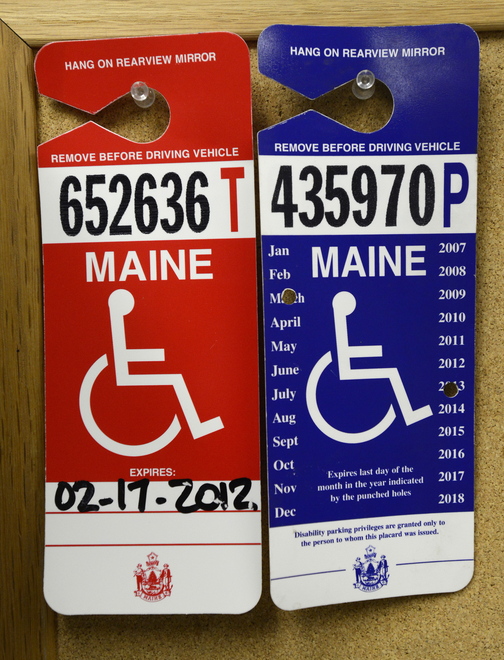In his 24 years working as parking enforcement officer in Portland, Andy Martin has seen and heard just about everything.
But there is one thing that the relatively good-humored Martin, the city’s senior parking control officer, can’t laugh off: the abuse of handicapped parking placards.
“There are some savvy people out there who know the game,” Martin said last week while making the rounds through the Old Port. “It’s the people who really need that parking I feel bad for.”
The abuse of handicapped parking placards comes in many different forms. Some people rub off and change the expiration date, which is handwritten using a magic marker on temporary handicapped parking placards issued by the state.
Others will use placards of deceased relatives who had a permanent disability. While those expiration dates are punched into the plastic placard that dangles from a vehicle’s rear-view mirror, Martin said some people will punch out a new expiration date and use the plastic to plug in the old expiration date.
“It makes my stomach turn just thinking about,” Martin said.
As it stands now, parking officers have no authority to issue tickets for these offenses.
That could change Monday, when the City Council takes up a new ordinance that would allow parking officers to issue tickets carrying $200 fines.
Handicapped parking placards are currently regulated by state law, Neighborhood Prosecutor Trish McAllister said in a Sept. 23 memo to the council’s Public Safety Health and Human Safety Committee.
McAllister said a police officer could issue a summons to people who abuse handicapped parking placards, but officers would have to wait for the offender to return to the vehicle to issue the summons in person.
The proposed ordinance would give parking officers the authority to leave a ticket on the windshield, she said.
Police Chief Michael Sauschuck said enforcing handicapped parking laws is important to ensure Portland’s most vulnerable citizens are protected, but officers are typically busy handling more serious crimes.
“Unfortunately, our officers are forced to use their discretion when determining whether or not they can take the extra time to wait for a driver to return to their vehicle or respond to the additional 85,000 calls for service that they are responsible for every year,” Sauschuck said.
Handicapped parking placards are issued at the state level by the Bureau of Motor Vehicles. Permanently disabled people receive blue placards, while the temporarily disabled receive red placards. Both require a doctor’s recommendation.
Green placards are for drivers who transport disabled people. These are abused, too, Martin said, because they are occasionally used for personal purposes.
Parking Manager John Peverada said the city does not track the number of altered parking placards parking officers see. However, he estimates the city has seen as many as 50 altered permits in recent years.
Martin said that figure represents an increase over previous years. “I don’t know if there are that many handicapped people out there or if it’s abuse,” he said.
The potential for abuse is high in Portland, because parking at times can be scarce.
Handicapped parking placards allow people to park in designated spaces. They also allow people to park for free in metered parking spots.
That has prompted some businesses to complain, Martin said, especially when the same person parks in the same spot for extended periods every day.
Over the course of less than an hour in the Old Port last week, Martin inspected about eight handicapped parking placards, none of which were altered. Typically, there are more placards, he said.
One vehicle parked at the corner of Market and Middle streets had an expired placard for a permanently disabled person.
Peverada said he would like to see more changes to the rules governing handicapped placards, including requiring people to carry identification cards with a control number that is the same as the parking placard and either stamping the expiration date with a machine or using the hole-punching system for all placards.
Martin said that handicapped parking is a sensitive subject – both personally and politically – so it is difficult to tighten the rules.
“You approach some people and they get really mad at you, but you’re actually trying to help them,” Martin said. “It’s kind of shaky ground for us because some people are disabled and you would never know it by looking at them.”
Randy Billings can be contacted at 791-6346 or at:rbillings@mainetoday.comrbillings@mainetoday.com Twitter: @randybillings@randybillings
Send questions/comments to the editors.



